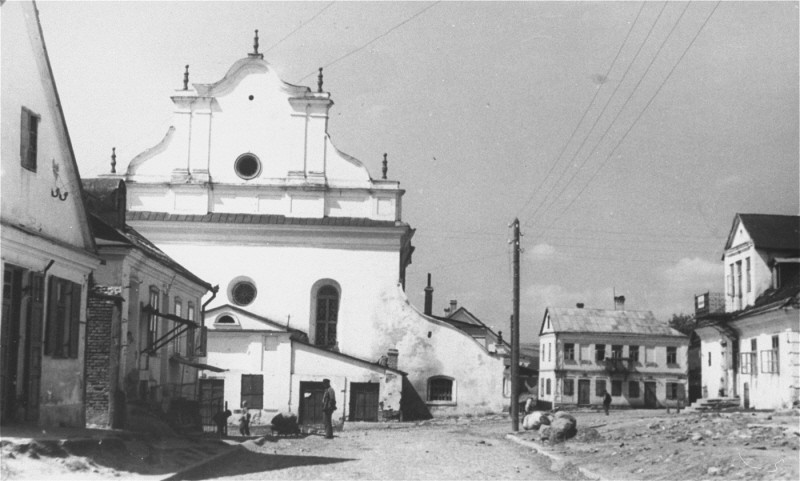
About Life after the Holocaust
With the end of World War II and collapse of the Nazi regime, survivors of the Holocaust faced the daunting task of rebuilding their lives. Listen to the stories of six Holocaust survivors whose journeys brought them to the United States. Their experiences reveal the complexity of starting over.
With the end of World War II and collapse of the Nazi regime, survivors of the Holocaust faced the daunting task of rebuilding their lives. With little in the way of financial resources and few, if any, surviving family members, most eventually emigrated from Europe to start their lives again. Between 1945 and 1952, more than 80,000 Holocaust survivors immigrated to the United States.
Life After the Holocaust was a project of the United States Holocaust Memorial Museum to document the experiences of six Holocaust survivors whose journeys brought them to the United States. Their experiences reveal the complexity of starting over.
Listen to the Stories
Project Notes by Arwen Donahue
In 1994, Joan Ringelheim, head of the United States Holocaust Memorial Museum's Department of Oral History, had the idea of starting an interview project on the postwar experiences of Holocaust survivors. I was fortunate to have joined the oral history staff soon after that, and so was intimately involved with the Museum's Post-Holocaust Interview Project from the time of its inception. The project was unique in its conception, and the interviews' contents were fascinating and illuminating. Most oral history interviews with survivors focus almost exclusively on experiences that took place from 1933 to 1945. This is understandable, but a survivor's life—as any person's—cannot be confined to an event in history. A life is always growing and changing, always open to interpretation, always defying definitions. By focusing on the present moment as well as recent years, Post-Holocaust Project interviewees had plenty of room to explore and reflect upon their lives as whole people, rather than being only “Holocaust survivors.”
The opportunity to work with Regine Beyer on a series of audio portraits of survivors' postwar lives was a tremendous one. It was an opportunity to bring what I'd learned from years of listening to Holocaust survivors to bear-to wrench open stereotypes, to present these people to a public audience in all their glorious diversity and complexity. Also, the interviews provide an opportunity to reflect on the culture and society we have made since the end of the war: our strengths, our prejudices, and our struggle for a genuine democracy; our struggle to learn to listen to others with the deepest respect and most careful attention.
Project Notes by Regine Beyer
In 1995, when I got word that the staff of the United States Holocaust Memorial Museum's Department of Oral History was looking for radio producers willing to conduct taped interviews on the experience of Holocaust survivors and their lives after the War, I did not hesitate to apply. For me as a post-war generation German, born and raised in Berlin, it presented itself as a rare opportunity: in Germany, I had done much to enlarge my knowledge about the War and the Holocaust, and the socio-political circumstances that made both possible. Yet I had never met and spoken with Jewish people before. And I'd never before seen a chance to help preserve the memories and stories of some of those who had survived and managed to rebuild their lives.
For many, many subsequent hours I listened and I learned. About the tremendously varied experiences of "survivors", for instance, and that human beings cannot be reduced to one period of their lives, even though it might have been the determining one. About the strength of mind and spirit in sometimes frail bodies. About forgiveness, and not being able to forgive. About mutual sympathy and respect despite age and cultural differences.
Some of what I learned influenced my criteria for choosing the five people presented in the audio programs. In dialogue with my colleague and friend Arwen Donahue, I looked for varied prewar backgrounds, War experiences and post-War lives. Kept an eye on gender parity. Looked for people who tell their stories well (without sounding "professional"
in any way). People who make us LISTEN once again and perhaps provide a different view on aspects of the overall story we have taken for granted.
The people whose stories can be heard on this website are human beings who made a great impression on my life and whom I will never forget.
Project Credits
This program is part of "After the Holocaust," a series of audio profiles of Holocaust survivors in America. It was conceived and written by Regine Beyer and Arwen Donahue.
Studio production by Regine Beyer with Helen Thorington, engineer, at the New Radio and Performing Arts studio in Staten Island, New York.
The narrator was Jane Altman.
Special thanks go to the German Radio Archives, DRA, in Potsdam-Babelsberg; to Belgian producer Ronny Pringels and to German producer Helmut Kopetzky for the use of sounds from their archives.
"After the Holocaust" is a production of the United States Holocaust Memorial Museum.
The interviews in this program were conducted for the Oral History Department of the United States Holocaust Memorial Museum, with financial support by the Jeff and Toby Herr Grant.
The Museum gratefully acknowledges Jeff and Toby Herr for making these interviews and this audio series possible.
Critical Thinking Questions
- What challenges faced survivors of the Holocaust?
- How did various countries respond to the plight of survivors?

